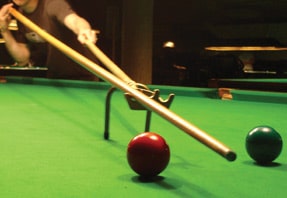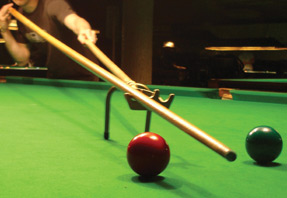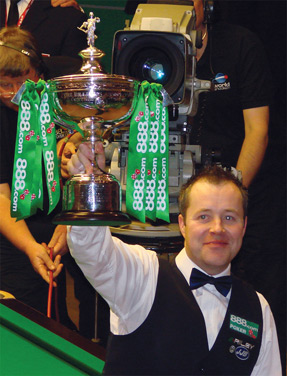|
1985, what a year. Mikhail Gorbachev took power in the Soviet Union,
Microsoft shipped its first version of Windows 1.0, the cartoon Calvin and
Hobbes was born and one of Britain’s biggest sporting heroes was a ruddy-faced
and cuddly Northern Irishman with spectacles as big as the bottom of a beer
mug.
His name was Dennis Taylor and his sport, snooker, was by some
yardsticks as big as golf. Football, Britain’s national game, was deep in
crisis, soiled by hooligans and run-down stadiums. So snooker made hay, winning
sponsors and fans with its safe, quiet drama televised in hushed tones by the
BBC. Players like Taylor became household names. His 60,000 pound prize for
winning the world championship in 1985 was only a shade less than Sandy Lyle
pocketed for his British Open golf victory and considerably more than Wimbledon
paid its doubles champions that year.
A record 1 in 3 Britons — close to everyone if you discount kids, those
without televisions and those who couldn’t stay up past midnight for the climax
of this epic match — tuned in as Taylor fought back from a seemingly impossible
position and sank the last ball in the deciding last frame of the world final
to down reigning champion Steve Davis, a Londoner with a deathly pallor under
his shock of ginger hair.
Snooker, in a word, was huge.
Now, the sport said to have been invented in the 19th century by bored
British army officers to while away their time in colonial India is fighting
for its life. Between snooker’s heights of popularity in the 1980s and the low
it hit this week, with tabloid allegations that its top player John Higgins
agreed to fix matches, lies a salutary tale of how even a successful sport can
slide into decline.
 |
| World snooker champion John Higgins was caught in a newspaper sting agreeing to fix a game for $400,000. |
Higgins, a three-time world champion, was ensnared in an elaborate
sting by News
of the World, the tabloid weekly that last year also
published a photo of Olympic swimming champion Michael Phelps puffing on a
marijuana pipe.
Posing as businessmen with ties to a betting syndicate, its reporters
filmed Higgins and his manager, Pat Mooney, in a hotel room in Ukraine
seemingly agreeing to lose games in return for a $400,000 payment. The story
was signed by Mazher Mahmood, the tabloid’s star investigator known as “the
Fake Sheik” because his underhand methods have included disguising himself as a
wealthy Arab.
Higgins said subsequently that he panicked. He said he feared that the
businessmen/undercover reporters might be “the Russian Mafia” and he decided
that “the best course of action was just to play along with these guys and get
out.”
But it still looks very bad. Most corrosive is the implication that
snooker matches can be easily fixed. In the video, Higgins appears to
acknowledge that losing to another player would be “no problem,” and Mooney
seemingly suggests that it could be done merely by missing a shot, saying: “You
roll two inches out of position.”
The video concludes with Higgins and Mooney downing shots of liquor
with the bribers, which appeared to undercut his claims that he was “really
spooked” and “just wanted to get out of the hotel and onto the plane home.”
Even before this affair, snooker was struggling. A ban on tobacco
advertising deprived it of sponsors who had helped to bankroll its golden
years. The number of tournaments and morale on the circuit sank so low that
Davis warned last year that even top 20 players were “thinking about getting
jobs because they are not making any prize money.”
To salvage its flagging fortunes, snooker turned at the end of 2009 to
Barry Hearn, a British promoter with a long record of success in boxing, darts,
poker and even fishing. He is offering guaranteed prize money of $6.8 million
next season to try to get players to line up behind his plans to revive
snooker, including launching a new tournament in Germany.
But Hearn seems to recognize that snooker’s credibility must be
restored first. He is suggesting that Higgins, the world No.1, could be
banished from snooker if it is determined that he was prepared to deliberately
lose.
Players “owe it to the public that watch these games to know and
believe and trust that every single shot they give 100 percent to,” Hearn told
the BBC, “because if the perception changes, the sport dies.” —AP
|





You must be logged in to post a comment Login